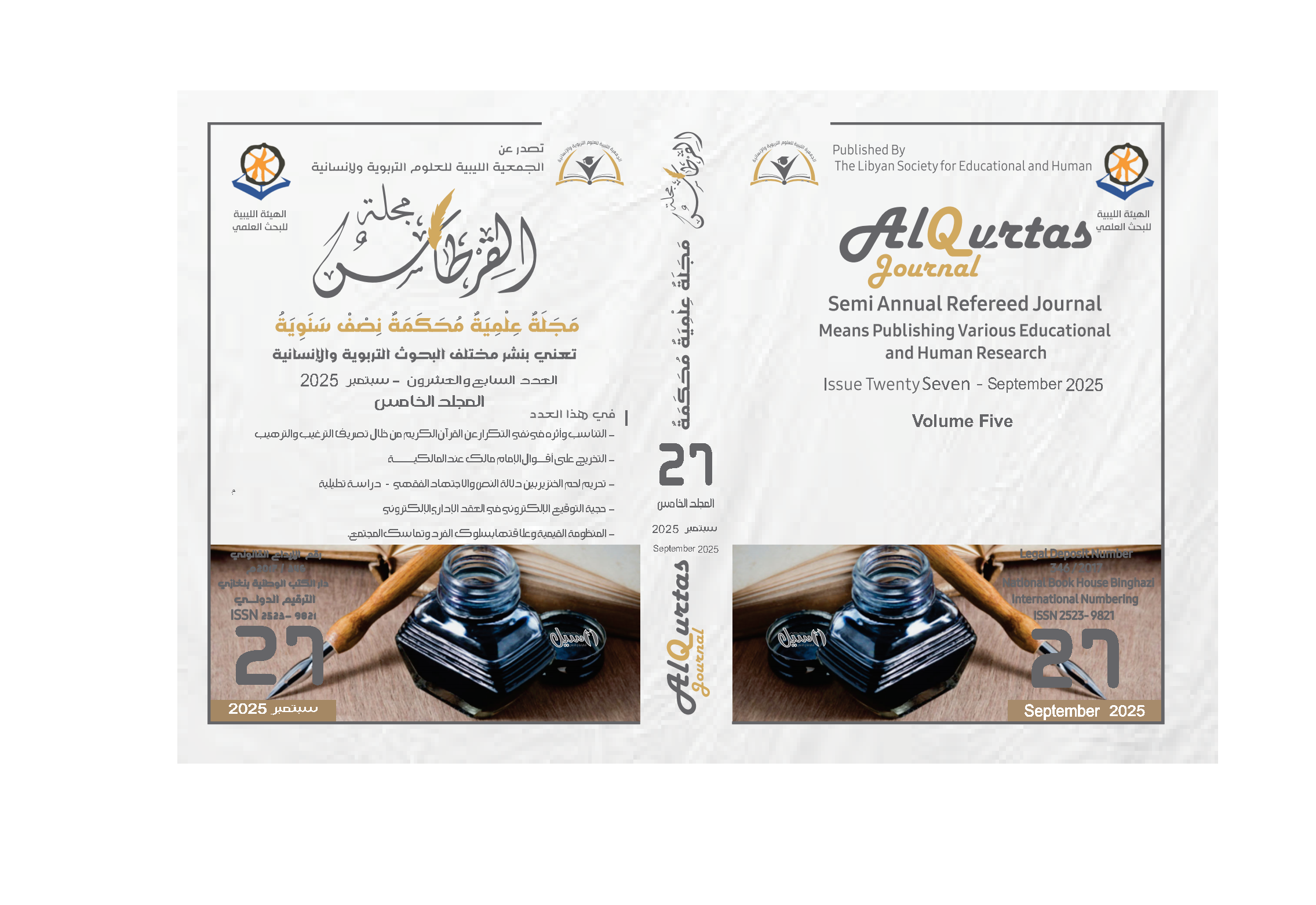Divergent Muslim Jurists Views on Conveyance of Reward from the Deceased
Main Article Content
Abstract
In the Name of Allah, the Most Gracious, the Most Merciful Praise be to Allah, by whose grace righteous deeds are completed, and by whose favor provisions are granted without measure. May complete and perfect peace and blessings be upon the teacher of humanity, the one sent as a mercy to all worlds—our Prophet Muhammad (peace be upon him)—and upon his family, companions, and all those who follow them until the Day of Judgment. The topic addressed in this study is among the most debated issues in Islamic jurisprudence across generations and regions. In the first part of this research, which was published in Al-Asalah Al-Ilmiyyah, a peer-reviewed journal issued by the Libyan Association for Educational and Human Sciences under the Libyan Authority for Scientific Research, I examined the subject under the title: "The Jurisprudence of Transferring the Rewards of Deeds to the Deceased in Light of Irshad al-Hayran by Abu Muzayriq: A Comparative Study with the Views of Other Scholars". This study appeared in Issue 11, Volume 2 (June 2025.) In that work, I explored Sheikh Ahmad Abdul-Salam Abu Muzayriq’s (may Allah have mercy on him) perspective regarding the non-transference of Qur’anic reward and certain acts to the deceased. His stance is grounded in textual evidence from the Prophet (peace be upon him), the practices of his Companions, and the early generations of scholars. I also analyzed how he described those who hold the opposing view, i.e., those who believe that rewards—such as recitation of the Qur’an—can reach the deceased. In this second part, I continue that investigation under the title: "The Jurisprudential Disagreement on the Transference of Reward According to Sheikh Ahmad Abu Muzayriq: A Study of Irshad al-Hayran," with a focus on analyzing the positions of classical and contemporary jurists, and how Sheikh Abu Muzayriq engaged with these differing views. This topic has long been a matter of discussion among scholars and laypeople alike. It has been independently examined as well as addressed within broader jurisprudential and theological works. Key prior studies include, but are not limited to: A Treatise on Gifting Reward to the Prophet (peace be upon him), with Issues on Gifting Acts of Devotion to the Deceased, and A Treatise on the Verse: “And that man shall have nothing but what he strives for” [al-Najm: 38] by Ibn Taymiyyah (d. 728 AH), edited by Abu Muhammad Ashraf Ibn Abd al-Maqsoud, published by Adwa’ al-Salaf. The Legitimacy of Gifting the Reward of Acts of Worship to the Deceased, a peer-reviewed study by Dr. Abdullah bin Hamad al-Ghutaymil, published in the Journal of the Islamic Fiqh Council, Muslim World League, Issue 7, Year 2 (Rajab 1421 AH.) The Ruling on Reciting for the Deceased: Evidence from the Qur’an, Sunnah, Exegesis, and the Four Schools, by Muhammad Ahmad AbdulSalam, reviewed by Mahmoud Mahdi al-Istanbuli. The Correct Position on Gifting Reward, by Abdulqadir al-Sibai, Dar al- ‘Uloom wal-Hikam. The Benefit of the Deceased from Recitations, Charity, and Other Good Deeds, by Ibn al-Barni (d. 622 AH), published by Dar Ibn Hazm. Tafsir al-Manar by Muhammad Rashid Rida (d. 1354 AH), Egyptian General Book Organization, 1990. Al-Ruh (The Soul) by Ibn Qayyim al-Jawziyyah (d. 751 AH), Dar al-Kutub al-‘Ilmiyyah – Beirut. My previously published study: The Jurisprudence of Transferring Rewards to the Deceased according to Irshad al-Hayran by Abu Muzayriq, in AlAsalah Al-Ilmiyyah, Issue 11, Volume 2 (June 2025.) ----------------------------------------------------------------------------------------------------------- ــــــــــــــــــــــــــــــــــــــــــــــــــــــــــــــــــــــــــــــــــــــــــــــــــــــــــــــــــــــــــــــــــــــــــــــــــــــــــــــــ مجلة القرطاس ــ العدد السابع والعشرون ( (139المجلد الخامس شهر سبتمبر 2025م This second part, like the first, adopts an inductive and analytical approach to assess the jurisprudential conclusions reached by Sheikh Abu Muzayriq. The paper is structured as follows: Introduction Chapter Two: Juristic Disagreement on the Transference of Reward Section One: Divergence among scholars on the core issue. Section Two: Juristic opinions regarding the permissibility of certain actions in life, particularly in relation to transferring their spiritual benefit to others. Each section includes detailed subtopics, followed by: Conclusion Footnotes Index Bibliography Table of Contents It is hoped that this study contributes meaningfully to the ongoing scholarly discourse surrounding this nuanced and sensitive area of Islamic jurisprudence. May Allah grant success and guidance.
Downloads
Article Details

This work is licensed under a Creative Commons Attribution-NonCommercial 4.0 International License.

